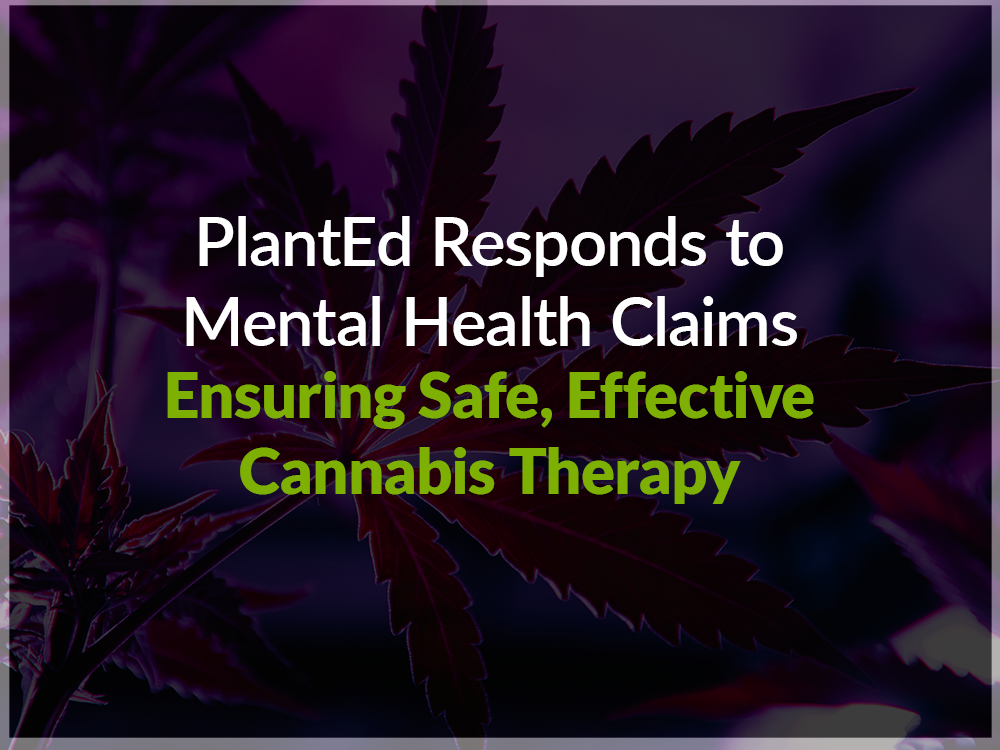Recently there have been reports in the media about negative mental health outcomes for medical cannabis patients, specifically relating to psychosis. PlantEd expresses sympathy and understanding to any patients that may have suffered adverse effects as a result of poor prescribing or dispensing.
We want to reassure current and potential medicinal cannabis patients that cannabis medicine when used therapeutically is safe and effective, if used correctly. In this context, it is important to distinguish between medicinal cannabis, prescribed and used under the care of medical professionals and, unregulated use of recreational cannabis.
Medicinal cannabis, like many medications, is not without side effects. Tetrahydrocannabinol or THC is the psychoactive compound found in cannabis plants that produces the "high" sensation. It interacts with the body's endocannabinoid system, affecting brain function and may alter perceptions, mood, consciousness, and behaviour. For this reason, it is critical that any doctor prescribing cannabis products is across the patient’s full medical history. For example, if a patient is prone to cannabis related side effects such as psychosis, anxiety, or paranoia. It's critical to limit use to products which are high in CBD and low in THC.
It is also important to note that while there are mental health risks involved with all cannabis use, they are extremely minimal. “It must be emphasised that the vast majority of people who use cannabis will never develop a psychotic disorder. It has been estimated that 4700 young people would need to be dissuaded from cannabis use to prevent a single case of schizophrenia.” ¹
We believe that part of the problem that we're experiencing right now is that high THC products are being prescribed without understanding the balancing effect of CBD and the fact that these two compounds work together. Studies have shown that CBD is so integral in preventing the negative side effects of THC and can actually prevent them completely when used in correct concentrations and dosages. ² ³
PlantEd was founded to address this exact gap in education. We place the highest value on positive patient outcomes and ensure that medical professionals (Doctors, Pharmacists, Nurses and other related professions) are properly trained in prescribing and administering and supervising patients on this medication.
We call upon any medical professionals working with medicinal cannabis to ensure that they are properly trained to do so. This training often counts towards your continuing professional development (CPD), so it is beneficial in more ways than one.
Dr Teh's full statement is available here

References
1. A primer on medicinal cannabis safety and potential adverse effects
Jonathon C Arnold, Volume 50, Issue 6, June 2021,https://www1.racgp.org.au/ajgp/2021/june/a-primer-on-medicinal-cannabis-safetyandpotentia#:~:text=It%20must%20be%20emphasised%20that,a%20single%20case%20of%20schizophrenia.
2. Boggs DL, Nguyen JD, Morgenson D, Taffe MA, Ranganathan M. Clinical and Preclinical Evidence for Functional Interactions of Cannabidiol and Δ9-Tetrahydrocannabinol. Neuropsychopharmacology. 2018 Jan;43(1):142-154. doi: 10.1038/npp.2017.209. Epub 2017 Sep 6. PMID: 28875990; PMCID: PMC5719112.
3. Hudson, R., Renard, J., Norris, C., Rushlow, W. J., & Laviolette, S. R. (2019). Cannabidiol Counteracts the Psychotropic Side-Effects of Δ-9-Tetrahydrocannabinol in the Ventral Hippocampus through Bidirectional Control of ERK1-2 Phosphorylation. The Journal of neuroscience : the official journal of the Society for Neuroscience, 39(44), 8762–8777. https://doi.org/10.1523/JNEUROSCI.0708-19.2019

